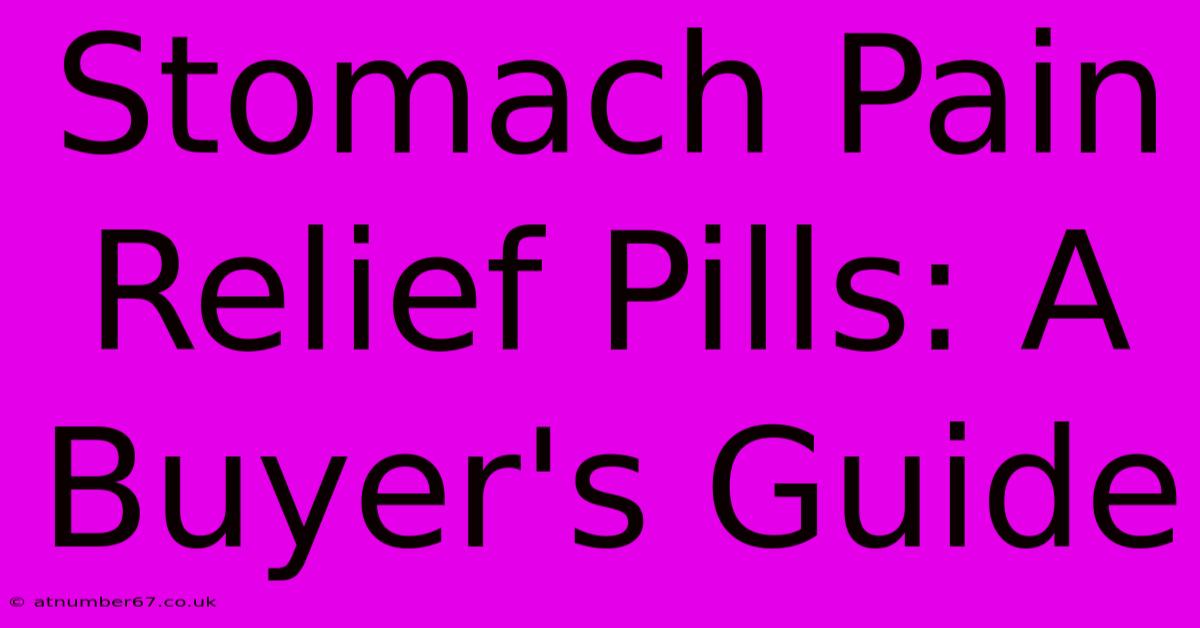Stomach Pain Relief Pills: A Buyer's Guide

Table of Contents
Stomach Pain Relief Pills: A Buyer's Guide
Stomach pain can strike unexpectedly, leaving you doubled over in discomfort. While a trip to the doctor is always recommended for persistent or severe pain, knowing which over-the-counter (OTC) stomach pain relief pills might offer temporary relief can be incredibly helpful. This buyer's guide will walk you through the different types of medications available, helping you make an informed decision when choosing the right pill for your needs.
Understanding the Causes of Stomach Pain
Before diving into specific medications, it's crucial to understand the potential causes of your stomach pain. This isn't meant to replace a doctor's diagnosis, but understanding the source can help you choose a more appropriate treatment. Common causes include:
- Indigestion: Often caused by overeating, eating fatty or spicy foods, or consuming alcohol.
- Heartburn (Acid Reflux): A burning sensation in the chest caused by stomach acid flowing back into the esophagus.
- Gas and Bloating: Trapped gas in the digestive system can cause significant discomfort.
- Menstrual Cramps: Hormonal changes during menstruation can lead to painful abdominal cramps.
- Constipation: Difficulty passing stool can cause abdominal pain and discomfort.
- Viral Gastroenteritis ("Stomach Flu"): A viral infection causing nausea, vomiting, and diarrhea.
Important Note: If your stomach pain is severe, persistent, accompanied by fever, bloody stools, or other concerning symptoms, seek immediate medical attention. This guide focuses on temporary relief for mild to moderate discomfort and should not be considered a substitute for professional medical advice.
Types of Stomach Pain Relief Pills
Several types of OTC medications can provide relief from stomach pain, each targeting different underlying causes:
1. Antacids: For Heartburn and Indigestion
Antacids neutralize stomach acid, providing quick relief from heartburn and indigestion. Common active ingredients include:
- Calcium carbonate: A readily available and effective antacid.
- Magnesium hydroxide: Another effective antacid, often combined with other ingredients.
- Aluminum hydroxide: Can cause constipation in some individuals.
Things to Consider: While effective for quick relief, antacids may not address the underlying cause of heartburn. Prolonged use can lead to side effects, such as constipation or diarrhea.
2. H2 Blockers: For Heartburn and Acid Reflux
H2 blockers reduce the production of stomach acid, offering longer-lasting relief from heartburn and acid reflux than antacids. The most common active ingredient is ranitidine.
Things to Consider: H2 blockers take longer to work than antacids, but their effects are more prolonged. They are generally safe for short-term use, but consult a doctor for long-term use.
3. Proton Pump Inhibitors (PPIs): For Severe Heartburn and Acid Reflux
PPIs are stronger than H2 blockers and significantly reduce stomach acid production. They are typically used for more severe or persistent heartburn. Common active ingredients include omeprazole and lansoprazole.
Things to Consider: PPIs are generally safe for short-term use but should be used only as directed by a doctor. Long-term use can lead to side effects.
4. Pain Relievers: For Cramps and General Discomfort
Over-the-counter pain relievers like ibuprofen (Advil, Motrin) and acetaminophen (Tylenol) can help alleviate pain associated with menstrual cramps or general abdominal discomfort.
Things to Consider: Always follow the recommended dosage and consult a doctor if you have any concerns. These medications may not be appropriate for everyone.
Choosing the Right Stomach Pain Relief Pill
Choosing the right medication depends on the type and severity of your stomach pain. Consider:
- The cause of your pain: Are you experiencing heartburn, indigestion, gas, cramps, or something else?
- The severity of your pain: Is it mild, moderate, or severe?
- Your medical history: Do you have any allergies or pre-existing conditions?
- Other medications you are taking: Some medications can interact with stomach pain relief pills.
Always read the label carefully and follow the recommended dosage. If your symptoms persist or worsen, consult a doctor or other healthcare professional.
Beyond Medication: Lifestyle Changes for Stomach Pain Relief
While medication can provide temporary relief, lifestyle changes can significantly reduce the frequency and severity of stomach pain. Consider:
- Eating smaller, more frequent meals: Avoid overeating.
- Avoiding trigger foods: Identify and eliminate foods that worsen your symptoms.
- Managing stress: Stress can exacerbate digestive problems.
- Getting regular exercise: Promotes healthy digestion.
- Staying hydrated: Drinking plenty of water helps with digestion.
By understanding the different types of stomach pain relief pills available and making informed choices, you can effectively manage mild to moderate stomach discomfort. Remember, seeking professional medical advice is crucial for persistent or severe pain.

Thank you for visiting our website wich cover about Stomach Pain Relief Pills: A Buyer's Guide. We hope the information provided has been useful to you. Feel free to contact us if you have any questions or need further assistance. See you next time and dont miss to bookmark.
Featured Posts
-
Shamea Mortons Net Worth A Look At Her Portfolio
Apr 01, 2025
-
Age De Pedri Turning Back The Clock Naturally
Apr 01, 2025
-
Discover Alvira Khans Sons Hidden Talent
Apr 01, 2025
-
Blackrock Net Worth Facts Figures And Future
Apr 01, 2025
-
Max Verstappens Net Worth Surprising Facts And Figures
Apr 01, 2025
